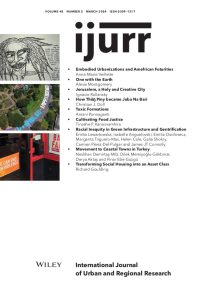This article explores the governance of risk in financialization through the entry of Real Estate Investment Trusts (REITs) and other investment funds into specialized supported housing in England. Supported housing is a form of care accommodation intended to enable vulnerable groups such as people with learning disabilities to live more independently. Since 2014, investors have targeted the sector, developing a leaseback model that has encountered controversy due to unsustainable rents and the near bankruptcy of at least one housing association. The article unpacks these dynamics by asking how financialization has generated risk through the imposition of a ‘care fix’ in the sector, drawing on qualitative data including interviews, financial and media reports, and court and regulatory documents. In answering this question, it argues that the contradiction between housing’s role as a private commodity and as a collective means of social reproduction generates tensions that suggest potential limits to financialization.
Details
Written by:
Richard Goulding
Digital Object Identifier (DOI)
https://doi.org/10.1111/1468-2427.13228
About DOI

